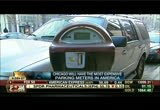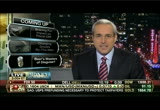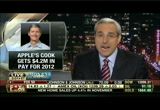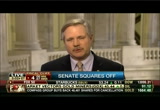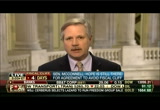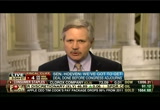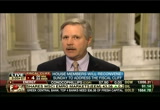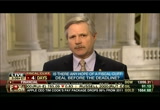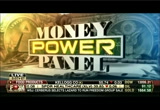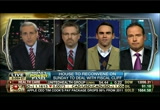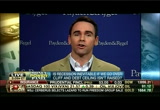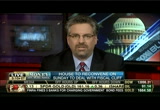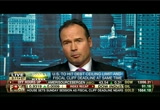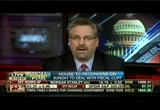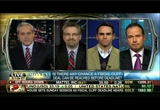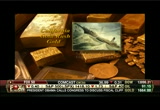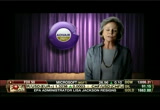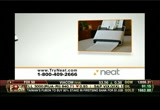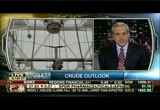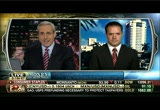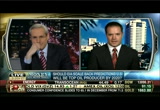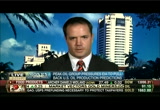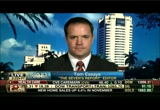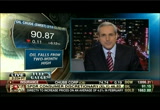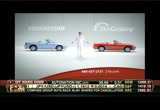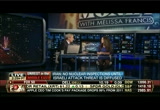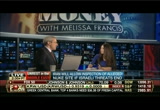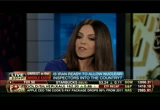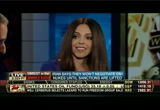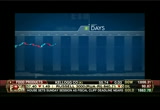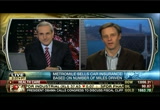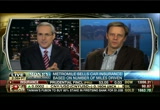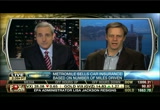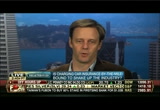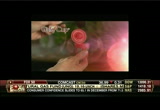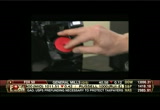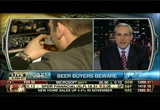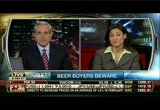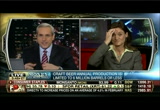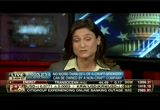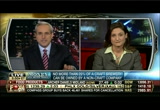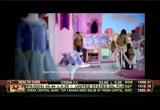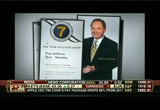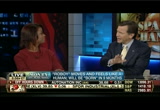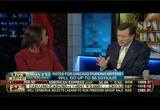tv MONEY With Melissa Francis FOX Business December 27, 2012 5:00pm-6:00pm EST
5:00 pm
closer to sharks than expected. a 33-ton aquarium shattered without warning just as people were admiring it. it sent glass and fish flying. i say fishes. these are dangerous sharks. it held turtles and small fish and three lemon sharks. some people at the mall did suffer cuts and bruises but apparently no scharping shark bites. shibani: i wonder if they had some bites. chicago will hold the title of most expensive meters in north america. it will cost you a whopping 6.5 bucks per hour. david: per hour? shibani: in the loop. seems like a bargain at 5.75. it will be the fifth year in a row the privately managed parking meters are going up. san francisco has the second highest rate. 5.5 bucks an hour, followed by new york and los angeles at five bucks. never complain again when you're filling up the meter. david: unbelievable. it is time for melissa francis and money. >> i'm adam shapiro in for
5:01 pm
melissa francis. here's what's "money" tonight. brace for impact. senate majority leader harry reid says it looks like we'll head over the fiscal cliff. with just four days until the deadline can president obama and congress still pull out a deal in the nick of time? senator john hoeven of north dakota joins us to respond. plus, a game-changer for the insurance industry. an auto insurer unveils new policies that charge by the mile, giving a big potential boon to drivers. can it drive the competition off the road? the ceo of metro mile is here to take the wheel. and big beer companies putting beer goggles on their customers. the market for kraft beer is booming and big labels are battling to get a foothold but they may be using crafty tactics to sell you the same flat brew in different packaging. less filling tastes great. even when they say it's not it is always about money
5:02 pm
adam: before we serve you that beer let's look at the day's market headlines. stocks fell for their fourth straight session. that dour outlook on the fiscal cliff from senator harry reid sent stocks tumbling but they came off the session lows following word the house would reconvene this weekend. the dow lost 18 points. jitters over the fiscal cliff sent the fear index or the vix leaping yet again. it hit the highest level since july. the vix is up 30% over the last month. apple's tim cook is getting a 99% cut in compensation this year. cook will take home $4.2 million compared to 378 million bucks in 2011. apple made clear the decline has nothing to do with performance. cook's sky-high 2011 pay package was largely award of one million restricted
5:03 pm
shares of stock after he took the reins at apple as ceo. that money would come in handy in washington, wouldn't it? that is our top story. the senate convened today for emergency session to deal with the fiscal cliff. the house has announced plans to reconvene on sunday. both senate majority leader harry reid and senate minority leader mitch mcconnell spoke a short time ago and neither sounds hopeful of fiscal cliff deal will be made before the deadline. so at this point is there any chance the united states can avoid taking a fiscal cliff dive? joining me for more is republican senator john hoeven of north dakota. and very simply, sir, we appreciate you being here but is harry reid right? are we going off the cliff? >> well, adam i hope he is not right. at this point president obama indicated he is going to call and talk to our leader, mitch mcconnell, senator mcconnell and make a proposal. we're very interested to see what that proposal is. we put revenues on the table.
5:04 pm
there needs to be some savings. and i believe we can get a deal so let's go. adam: what will the do look like? the president at one point actually upped what he was willing to tax. he wants taxes. originally saying on incomes of 250,000 and up. then he went to 400,000. what kind of compromise do we need from both side to get a deal done so that i don't have to keep boring people with this term fiscal cliff? >> right. to really get the deal done right you need about 4 troll trillion to get us back on track. that means pro-growth tax reform, entitlement reform and better control of savings of the proposals at this point are not at that level. they're more $2.5 trillion range. we're very anxious to see what the president will put forward in terms of savings and reform. adam: in roughly four days can all of you in washington get this deal done? or is it going to be some kind of a patch with some kind of delay and than we'll deal with the new congress
5:05 pm
deals with it? >> well, adam i think you're kind of on it there. it would be great if we can get it done. if not let's at least get the framework to set it up and finish it off right away. either way we have to get a deal done before congress gets adjourned or get a deal done in the new congress. there is enough proposals put forward. get the deal we need to get things on track. adam: we should point out i think senator scott brown out of massachusetts leaking some details what people are expecting the white house to be sending to both sides, democrats and republicans on the hill. do you think that what the president's going to send is something that john boehner can sell to his caucus? >> it needs to be. look there has to be more savings. what the president has talked about is more revenue but the concern is, that if the revenue goes to more spending you haven't solved the deficit and the debt. the real secret to getting this thing working is getting economic growth that
5:06 pm
generates revenue rather than higher taxes. those are elements that we need to get a deal that works and that's why we think there's chance here if the president will come back with some of those savings in his proposal. adam: but here's, we had an economist on yesterday who has no skin in this game politically which gives her credibility to what she had to say. she said the most dangerous thing we could do to the economic recovery is raise taxes. tte president clearly will not give on that point. he is going to raise taxes. if she's accurate, that the worst thing we could be doing right now. why would republicans give in to that, even if it's on the top 2%? >> what republicans want to do is close loopholes and limit deductions, not raise rates but i believe the president one way or the other, the president is going to force rates higher on the upper end. i don't know that there is any way we can stop that. i agree with you. the real revenue comes from economic growth, not raising rates, or with the economist that you cite but at this point we've offered revenues
5:07 pm
through closing loopholes, limited deductions. that is the right way to do it. the president seems determined to force some tax rates higher. adam: it is a given we'll have taxes going up on some folks in this country, whether the worst-case scenario going over the cliff or a deal. let's look at some of the cuts. when you talk about closing loopholes, i think people understand that maybe some of the wealthier among us will lose their mortgage interest deduction, whatever that will look like. but what about spending cuts? is it defense cuts? is it health care cuts? where are those cuts going to come pro? >> we've already made some cuts in defense. obviously with sequestration there is a lot more. i think sequestration is not the way to go. we could do a better job prioritizing. they will come out of a lot of areas. agriculture, we put together a farm bill that cuts 23 to 35 billion. you put that in the mix. again we have to go through all aspects of government to figure out where we can save and at the same time we've got to reform entitlement
5:08 pm
programs to make sure they're is vent for the long term the those ideas have been put forward. we have to come together on a package and do it. adam: this is simple yes or no, senator before i let you go. are you here monday night talking to us about how we go over the cliff or do we get a resolution, yes or no? >> yes, i think there is chance we will be. the house is coming back. that's a good sign. let's get everybody here. let's get after it. adam: senator john hoeven, one of the most popular governors when you were governor of your state. thanks very much for joining us the senator joining us from washington, d.c. we'll not let this one go though because obviously it looks like a complete absolute mess in washington, d.c. can the gop and democrats still pull a deal out of the fire before the deadline? i'm joined now by our money power panel. steve hayes, senior writer with the "weekly standard" and fox news contributor. jeffrey cleveland senior economist. and doug cote, chief market strategist with ing investment management. i will start with you, sir,
5:09 pm
doing, sure looks like investors believe we'll get a deal. what do you think? >> i don't think it matters. really what i'm focused on i know what the budget control act of 2011 is. let's call it what it is. it is a loss. why will there be tinkering in the last few days? as a strategist i will not be able to discount what they're doing. i think they just make it worse. i know what i'm getting. they're balanced on increasing taxes. i don't like increasing taxes. i like pro-growth economics but we need to cut spending. right now the law does it. i think go over the cliff. we know exactly what is going on. i'm concerned about a lot more things around the globe, particularly corporate earnings than i am the fiscal cliff. adam: all right. jeffrey cleveland, you're an economist, which is worse, raising taxes doing austerity all at once? what you do i this? >> i think the biggest problem is the uncertainty with all this. we're at december 27th. we're talking about changing the rules of the game. i think from an economist's
5:10 pm
standpoint, from an investor's standpoint rules, whether they're tax rates or spending rates, those are the signposts for the entrepeneurs. that is how entrepreneurs set the agenda for growth and economic activity. if you're adjusting those signposts, adam, at the last second, that is bad for growth. sort of like if you're on the super high wand a keep changing exit signs. you can't stop. adam: steve hayes, i will get to you in a second. jeffrey i want to follow up with what you just said. are you saying small business is entrepreneurs, all kinds of people already planned their strategy for 2013 based on spending cuts out of washington and very large tax increases out of washington? >> i think the heightened uncertainty about what the rules of the game are actually going to be next year has caused a decline or at least a slowing of capital investment. i think you see that in the data, in the third and fourth quarter and also in hiring. i think you're seeing maybe between one and two million fewer people hired in this recovery because of the
5:11 pm
heightened level of economic policy uncertainty coming out of washington. adam: steve hayes, i'm curious. we saw what happened in the market today. you had harry reid this morning saying we'll probably go over the cliff. we were down triple digits. then you had the announcement the house would reconvene. we almost rebounded. only closed down 18 points. where is all this going? i think the american public is ready to throw all of them into a room and lock the door and light a match. >> i'm with the american public on that. it's bad and what people come to expect from washington and to a certain extent i think i agree with both the other panelists. you had this going on in effect for a year not as intensely for the past several weeks but we've known about the uncertainty. there has been in paradoxical way certainty about the uncertainty you know this will happen. we bet on recent experience congress will either fail to get something done or get something slapped dash and ugly at the last minute. i think you have american public that be looed at
5:12 pm
this. said a pox on both of their houses and come to expect basically the worst from washington. adam: doug, let me ask you this. on behalf of those of us who do 401(k)s, mutual funds, ira's, i'm concerned about earnings reports but more concerned about what happens to my 401(k). what will happen to my 401(k) if they don't get a deal? >> you will have volatility either way. opening market, there is a little euphoria opening bell. i would say a week or two later reality will set in. i think the market goes down. i you have to prepare for that and be defensive. again with corporate earnings going down, if there was, if this were happening with positive fundamental backdrop, that would be one thing but it's a negative fundamental backdrop with the fiscal cliff. markets are going out there just downwards. adam: jeffrey what he touched upon i believe we go into recession. there are sure indicators we may be headed that way. consumer confidence the number today was not very good. it was far below what
5:13 pm
economists expected. are we already there have we brought about a self-prophecy because of this fiscal cliff craziness? >> we've seen slow down in capital spending. we've seen a slowdown in hiring. we've already seen to certain extent some of the effects of the cliff. i don't think we'll go into recession, adam. i think we'll experience continued period of subpar economic growth. but a lot of indicators i'm looking at tell me continued, moderate growth, not a recession in the next six to 12 months. adam: steve hays, if we're not going into recession as jeffrey predicts why not go of the cliff? why not have the immediate austerity? tax increases are detrimental but wouldn't bring about recession according to jeffrey? >> i think there is certainly a difference of opinion among economists on that. the cbo projected that we would in fact go into recession. others said the same thing. in fact the president of the united states in an exchange he had with paul ryan back in 2010 said the last thing you want to do when the economy is struggling to
5:14 pm
sort of gain ground is to raise taxes and he said to cut spending. i don't agree with him necessarily on the spending although i would have done it more gradually. but the president of the united states made the case i thought rather convincingly you don't want to raise taxes because in his words it would kill jobs and hurt businesses. that president who made that argument then certainly seems to believe something pretty close to the opposite now. adam: doug, you get the last word. are we going off the cliff or not? >> we are going off the cliff. it is large, the budget control act of 2011. it is too late but i think future taxes, if we get spending under control, future taxes will be discounted lower because we'll have a better budget backdrop. adam: sounds like we're going to revisit this entire issue after the first of the year and when the new congress gets in place. steve hayes, jeffrey cleveland, doug cote tee, thanks for joining us on melissa francis's "money". >> thank you. adam: the eia says the u.s. will become the world's top oil producer by the end of the decade but one
5:15 pm
influential oil group says, not so fast. did the bold prediction go too far? the answer may sound crude. plus iran demands fresh terms to renew inspections of its nuclear program. is it ready to come back to the negotiating table or is ahmadinejad bluffing to buy critical time? more "money" coming up. ♪ copd makes it hard to breathe,
5:17 pm
so now i can be in the scene. advair is clinically proven to help significantly improve lung function. unlike most copd medications, advair contains both an anti-inflammatory and a long-acting bronchodilator working together to help improve your lung function all day. advair won't replacfast-acting inhalers for sudden symptoms and should not be used more than twice a day. people with copd taking advair may have a higher chance of pneumonia. advair may increase your risk of teoporosis and some eye problems. tell your doctor if you have a heart condition or high blood pressure before taking advair. if you're still having difficulty breathing, ask your doctor if including advairould help improve your lung function. get your first full prescription free and save on refills advaircopd.com.
5:19 pm
♪ . adam: welcome back to "money". the energy information administration recently made a prediction that grabbed headlines around the world. the united states it said will become the world's top oil producer by the end of this decade, 2020 but the eia is taking serious heat for that bold call. the association for the study of peak oil and gas says the eia must revise its prediction, claiming it creates a misleading picture of u.s. energy supplies. did the eia complete completely overshoot or will it prove spot on? we have a editor of the 7s report. thanks for showing up. the eia said the united states is on track to do this but where are they
5:20 pm
getting it wrong? are they confusing u.s. energy overall with just oil or are they making some other flaw in their logic? >> hi, adam. that is exactly right. so it is feasible by the end of this decade that the united states could be the world's largest energy producer but not the world's largest oil producer and you can see that just through the numbers. saudi arabia produces about 10 million barrels per day. we produce about 6.5 million barrels per day. certainly our energy production will grow but not that much. where the story on this is in natural gas. adam: right. >> that is the area of growth in the united states and if you throw that into the mix, then yes from a barrel of energy perspective we could be the largest producer in the world by 2020. adam: so this is important too. i want to point out to everybody the iea is not the eia. the iea is international energy administration. they got this started with their predictions about oil production. what is the outlook for the united states?
5:21 pm
we are pumping more oil. why couldn't we overtake saudi arabia? is that astronomical amount or is it harder to get it where we get it from now? >> certainly there's a big gap to fill but we have the resources here in the united states. part of the reason we don't produce as much energy as we should, it's the same problem we have in so many other facets of our economy. it's government. it's regulation. try to get a drilling permit. try and go through and drill shale now. you're seeing popular opinion push back on shale and tight oil which is the growth industry in the energy space right now. i mean there's a movie coming out next month about the evil of. adam: fracking right. >> evil energy executives who want to frack. adam: the prom is land is what it is called. >> you see push back. if we produce a lot more energy, absolutely. adam: a lot of us are intrigued by the ability of this country especially those of us who grew up in
5:22 pm
the '70s and '80s with oil being such a problem like the idea of the united states being energy independent. when you talk about that movie and fracking, certainly natural gas will play an important role in this country's future. it is making people wealthy and puttings people to work in parts of the country where they are allowing fracking. a recent governmental report that the environmental impact isn't known just yet. should we be rushing head long into this or slow down a bit? it will not go anywhere. the gas will always be there. >> that's true. a question of how expensive do people want their energy to be. if people don't mind it being expensive in recession let's stop and make sure there is as minimal environmental impact as possible. look the truth of the matter is it is in the country's national interest to become energy independent. whether or not we're the biggest producer or not doesn't really matter. what we should do is become energy independent. then a lot of things for this country get a lot easier. we of course have to worry about the environmental impact but at the same time if we have to get this
5:23 pm
energy it is a breasting as a resource and we need to exploit it. adam: last question for you. if i'm an investor how do i play this? price of energy even though we produce more it won't come down. brazil as those economies grow in south americas, i would imagine there has to be a way to make some money on this? >> absolutely, adam. the big story is again natural gas and the transportation of natural gas. you could see the united states overtake russia and become the largest natural gas exporter in 10, 15 years. so where you want to invest in the true great trend in this is in natural gas transportation. so liquid lng tankers, natural gas gathering facilities, that is the future of energy in this country. adam: tom, thanks for joining us right now. we certainly have a lock on hot air coming out of washington. natural gas, 15 years down the road as tom is saying is the potential for us. thank you very much, sir. >> thank you. adam: time for today's fuel
5:24 pm
gauge report where we break down the biggest headlines affecting the energy industry. lisa jackson says she will step down as head of the environmental protection agency next month. jackson served as the epa's chief for four years. her tenure was marked by high-profile battles over regulations on coal plants, the keystone xl pipeline and pollution mandates. the epa's deputy administrator will run the agency until jackson's successor is named. the brutal winter storm battering the northeast is pushing up heating oil futures. the national weather service says below normal temperatures will dominate the northeast until january 9th, raising the outlook for two-month highs after a choppy trading session. fiscal cliff woes helped fuel that decline. it settled at $90.897 a barrel. we'll turn our attention to international issues. iran offers terms to allow new inspections of its nuclear program. is it just a ploy or a sign the regime is finally
5:25 pm
5:29 pm
then i read a book while teaching myself how to play guitar; ran ten miles while knititting myself a sweater; jumped out of a plane. finally, i became a ping pong master while recording my debut album. how you ask? with 5-hour energy. i get hours of energy now -- no crash later. wait to see the next five hours. ♪ . adam: iran is detonating a nuclear rhetoric once again. the rogue state says it will allow iaea inspectors to access a military base suspected being a secret nuclear site but hold on a second. it is not without conditions. iran says they won't enter into any negotiations until western sanctions are lifted and any threat of attack from israel is diffused.
5:30 pm
so are the iranians ready to talk or is this a ruse to get the west off their back? joining us with more is a senior analyst for a global consulting firm and fox news contributor. start with israel. any chance the israelis would ever back off? what do they mean by diffuse? >> what does it mean by backing off? what the israelies are doing surveilling the situation. it is not within our timeline but within their own. over three decades the iranian regime has not been shy about being, openly public about wanting to blow israel off the map. adam: right. >> israelis will do whatever it takes to protect their extension --. adam: they will protect the sit currency. make a threat against israelis the israelis believe you. you won't get second chance. the timeline is year where iran keep as -- get as nuclear weapon. >> 2013 is what we're
5:31 pm
keeping our eyes on. adam: why would iran make a statement today? if they're on track -- >> great request why today and why this site? this site has been, of interest to iaea and the global community for a long time now. they have been denied access. all of sudden the iranian regime says, go ahead. we're rolling out the red carpet. come take a look. they probably had time to clean it up. the only time the iranian regime makes concessions is under two conditions. whether they're trying to hide something. could be human rights or internal conflict in the country. or, they feel cornered. right now they obviously feel cornered. they feel cornered by israeli timeline, the military threat and they feel cornered by the e.u. and the united states with these heavy sanctions. adam: let's talk about the sanctions. nothing ruins a global economy like a little black swan event in the middle east known as a war. certainly this could spark something between israel and iran. already iranians have been living under, you know,
5:32 pm
international sanctions going back to twrooen. it is having impact, is it not. >> absolutely it is having an impact. depend what kind of impact we're talking about. is it halting the nuclear agenda. adam: no. >> is it making them good boys and girls? no. is it having economic impact? absolutely. we have many reasons to believe, leaders iranian regime came out and said their economy is being battered by sanctions. which have 40% inflation of their currency. we have 50% slowdown of their oil exports which is 80% of their total economic output the so we can't really say it is not having an impact. but, we must say that there are two economies that are at work in iran. you have the regime's economy and you have the people's economy. and of course the regime's masterful passing along this burden to the people. of course the people are suffering more and the regime is finding loopholes but little by little we're getting better and better enforcing these sanctions. adam: so how bus the western world respond to this latest
5:33 pm
declaration from mahmoud ahmadinejad? >> we can not believe by them. they want the upper hand should they go into negotiations in the future. they don't want to look like they're any weaker than anyone else coming to the table but you know --. adam: what should we do? the key to good negotiation you have to give your opponent an exit. what is the exit we give them? >> it will not be precondition taking sanctions off the table because why were the sanctions imposed in the first place, right? if we give a little, we can make loosen the sanctions a bit but then again, how are we going to believe them and trust them? they played this pattern out many times where they give us the bait. they want us to concede but they're not going to keep their end of the deal. adam: lisa, sure sounds like 2013 one way or another will be the end of this. i don't want to say the word game. this is deadly serious. we appreciate you being here. >> thanks. adam: it is a whole new course for auto insurancc urns how one cop changes the game by offering per mile
5:34 pm
fees. its ceo joins us next to tell us how to get in on that one. microbrews spilling over like a badly poured pint. one brewer of beers may be brewing schemes of their own to pour big profits back into their wallets. "piles of money" coming up. beware the beer goggles. it never worked when you were 21. ♪ .
5:38 pm
♪ . adam: with all the talk about the fiscal cliff and debt ceiling people are feeling the pinch. money is tight. budgets are even tighter. one company is banking on the odds you will want to save money with your car insurance. this new device. it can make it possible to cut your auto insurance by up to 25%. all because you get charged by the number of miles you drive. we have the ceo of metro miles joins me now to explain how this works. and how does it work? how can you beat geico and progressive and all the others? how does this thing do it? >> well, the device is called the metro no, ma'am. and it alas us to track -- allows us to track the number of people drive. what we've seen in the u.s. is a change the way we're using our cars.
5:39 pm
and there is a big divide growing between high mileage drivers and low-mileage drivers. for example --. adam: what is the average per year. used to be 12,000. are we still putting 12,000 on the car? >> used to be 12,000. for the average person under 35 years old, they drive 3,000 miles less than they did 10 years ago. they're driving about 8,000 miles per year. adam: okay. >> when we talk from the people, we hear gas prices are going up. i'm trying to save money. i'm trying to do the right thing for the environment by walking, using my bike. taking public transportation. adam: how do you save money? when i buy car insurance, i'm buying the coverage, god forbid i should be in an accident. i might hurt somebody. how does your plan work? am i paying per mile? is there base fee? how does this work? do i get come probable coverage. >> yeah so there a base fee. people pay a few cents per mile. base what i happens is.
5:40 pm
you have you have a few cents per mile. the device tracks how many miles you drove in the month. when you get end of the month. here is rate per mile. here is number of miles i drove. here is what i pay. people see if i drive this many miles less this is how much i save. adam: base fee is 20 and $30, right? >> varies by person but 20 to $30 is the typical that we see. adam: then you will pay anywhere from two to six cents per mile? >> that sends to be what most people see, correct. adam: so, in a worst-case scenario, say i'm paying your most expensive base fee at your most expensive, you know, per mile right. what is my annual insurance cost going to be? and is it the same plan i would get from a state farm or a usa a as far as coverage? >> so the plan is the same. exactly the kind of car insurance you expect to have in terms of --. adam: deductible coverages? >> you get all that kind of stuff so it looks like a normal policy but depending how much you drive you're safing. >> how much? how much out-of-pocket?
5:41 pm
>> so the crossing point is generally about 10,000 miles per year. adam: okay. >> like i said before, if you drive about 8,000 miles per year, most people save 20 to 25%. it goes up from there. we have people that are driving their car, almost none and saving 50, 60% compared to what they were paying before. adam: i could save $1,000 a year on auto insurance and i drive 8,000 miles or less if i'm one of younger people mentioning my -- >> 750, $800 a years correct. adam: how long have you been doing this? how do people get in on it? are you licensed in new york and other states? >> we launched three weeks ago. we started in portland and looking to expand from there. we're licensed in oregon right now to sell the product there. then we're looking expanding from that point. adam: real quick, are you able to tell us what states are going to be next? i imagine a lot of people will want to get in on this? what is your website? how do they find out more? >> metromile.com.
5:42 pm
that is where they find out more. we're looking into states we will expand into, we're looking for cities with similar pats earns people use public transportation, alternative transportation and as a result are driving less. cities like san francisco, seattle, new york, boston, are great places for this product. adam: sound like a great idea. again the website, people learn more about it, i imagine they want to watch when it will come to their city, if they want to save some money this sounds like an option to follow. >> great, and thank you. adam: thank you, steven. you be well. now small label craft beers are all the rage and big boys like anheuser-busch are scrambling into the market but their push may leave beer lovers feeling skunked. we'll tell you why that brew may be a bust. at the end of the day it is all abouter boo, and then money. ♪ .
5:46 pm
5:47 pm
biggest companies like anheuser-busch and sabmiller are passing off mainstream products as craft beers. it is not hard to guess why. last year overall beer sales in the united states were down 1.3% while craft beer sales were up 13%. as big beer companies hop into the craft beer market more and more consumers are mistaking it for, well the real stuff. what does it mean for a beer lover and the industry as a whole? we have the brewers association craft beer program director julia hirt. thanks for joining us. i'm thinking of great lakes brew. they are in cleveland, ohio. i believe they would qualify as a craft beer. what is a craft beer and is there a standard that people are violating? >> sure, we don't define what a craft beer is. that is up for the beer lover in the marketplace to decide but we definitely define what a craft brewer is. if you google it, small and independent go hand in hand with what a craft brewer is. adam: what is craft brewer?
5:48 pm
>> producing less than six million barrels of beer a year. and they're independently owned. and frankly some beers in the marketplace right now, restaurants i go into, are presented as craft and they are not. they are not considered craft brewers. adam: is think any kind of recourse? if you love great lakes ail, they have burning river brew -- aisle. how do you no you're getting real thing and what can you do about it? >> one thing we all do as consumers we look to the label to tell us information. anything we consume we do that. sabmiller who owns blue moon or, shock top by anheuser-busch inbev, if you look at labels you can not tell they are owned by large conglomerate global brewing companies. we at brewers association call for transparency in ownership. we feel that is important thing for beer lover to know. adam: i always thought it was.
5:49 pm
who makes line. >> they are made by miller coors. adam: if you're buying lino krugel, are you drinking old craft brew recipe or miller shoved into a new bottle? >> it is relative. as a beer lover become informed what you like and what hones the brands behind what you are enjoying and you have at least a chance to make important decision. >> julia, you said it is all relative. listen i have relatives i don't like. would i like it, same old miller or lyne kugel, what am i drinking. >> it is owned 100% by miller company and up to i as beer lover to make the decision. adam: are they putting in old, like taco bell, they serve one thing in 15 different packages is that what the beer companies are doing? are they putting different product under different labels? >> it is interesting what is going on and the lines are becoming blurred.
5:50 pm
we have 2300 breweries in the united states. 97% of them qualify for our definition of craft brewer, small and independently owned. still so much of the beer in the marketplace sold by large producers is very hard to tell it is not craft. adam: julia, seems like a simple question, i'm sorry to keep hitting you on it. >> no, go ahead. adam: are they putting in their product,ing a good as might be in the, five different bottles with a different label but exact same thing if i go get a six-pack of miller? is that what they're doing? >> that is not at all what we're talking about here. we're not talking about quality. we're talking about who owns certain brands. that is very important. adam: why would this be a problem if we're not talking about quality? >> here's the deal. like i started to say, 2300 breweries today. in 1978 for example, we had 42 brewing companies, a very low point in our beer history as beer lovers. so as things have evolved a new marketplace for fuller flavored, more forward with malt, more forward with hops,
5:51 pm
a place in the market has been established by the small and independent craft brewers and that was not happening pre-1980. so today we've got large global producers trying to get into the space that the small and independent producers created and that's an issue. the small and independent producers do not have the same access to market that the large producers do. adam: quick question for you. general any cream ale, craft beer or one of the big guys. >> that is owned by --, no, it is not craft beer based on our definition of what a craft brewer is. adam: julia, i'm sorry i called you lisa. julia, i appreciate you being here. >> no problem. adam: i wish you all the best. i know people who are big beer fans and like craft beers want to know they're getting beer from a smaller company focused on that kind of product. thank you, ma'am. >> thank you. adam: so, call it jaws the alternative ending. sharks revenge. watch what happens when a "shark tank" bursts open right in front of your face.
5:52 pm
as shoppers in one mall find out, to quote the famous movie, they may need a bigger boat. you can never have too much money. ♪ . [ malennouncer it's tt time of year again. time for citi price rewind. because your daughter really wants that pink castle thing. and you realldon't want to pay more than you have to. only citi price rewind automatically searches for the lowest price. and if it findone, you get refunded the difference. just use your citi card and register your purchase online. have a super sparkly day! ok. [ male announcer ] now all youeed is a magic carriage. citi price rewind. start saving at citi.com/pricerewind.
5:56 pm
adam: it is time for a little bit of fun in the spare change. we're joined by our very own david asman. and we have seen this video. do you think american shopping malls are bad? check out this scary scene from shanghai. a shark tank burst open, injuring 16 people, leaving three sharks dead. who wants to go shopping in shanghai? fortunately nobody was seriously hurt. >> they were just trying to get away. >> these are lemon sharks. it makes me wonder about those huge skyscrapers. i wonder if you feel as safe being one of those things. adam: my reaction to that, the chinese are masterful with what
5:57 pm
they're doing is remarkable, but not known for quality control. >> if you want to get something done, bribe somebody. adam: moving on to the birth, nine months this little guy will be born. they have a signed this tendon driven robot to look and move like human beings even covered in soft skinned. >> we could use those now. >> might help at the military. the scary thing for me is not robust, but the idea of humans clones. because of the declining moral standards, somebody out there will come out with a human clone. that is truly scary. the weird thing is they are
5:58 pm
created without inception. they're created by an electrical spark. human being made, that is the weird stuff. adam: okay, we're going to move on. parking is about to get a lot more expensive in chicago. people go ballistic over this. parking rates in the windy city will go up $0.75 costing $6.50 to park for just one hour in some areas. do you think they will trade in their cars for bus passes? they privatize the parking system, they sold the parking meters. >> who wants to spend that kind of money to park a car, that is crazy. >> there is huge inflation. in new york it cost $13 to drive through the tunnels.
5:59 pm
$13, you do that everyday and yoimagine what people go throug. this is happening everywhere. adam: this is if they sold that system. >> this is an offshoot of inflation coexistence they are not having consequence is ridiculous. adam: another one out of chicago, nothing goes better with a slice of pizza then a cold beer. now a brewery is combining the world's most popular drink. you can get pizza flavored beer. anyone going to try this one? >> i thought it was beer flavored pizza. but
144 Views
IN COLLECTIONS
FOX Business Television Archive
Television Archive  Television Archive News Search Service
Television Archive News Search Service 
Uploaded by TV Archive on

 Live Music Archive
Live Music Archive Librivox Free Audio
Librivox Free Audio Metropolitan Museum
Metropolitan Museum Cleveland Museum of Art
Cleveland Museum of Art Internet Arcade
Internet Arcade Console Living Room
Console Living Room Books to Borrow
Books to Borrow Open Library
Open Library TV News
TV News Understanding 9/11
Understanding 9/11
